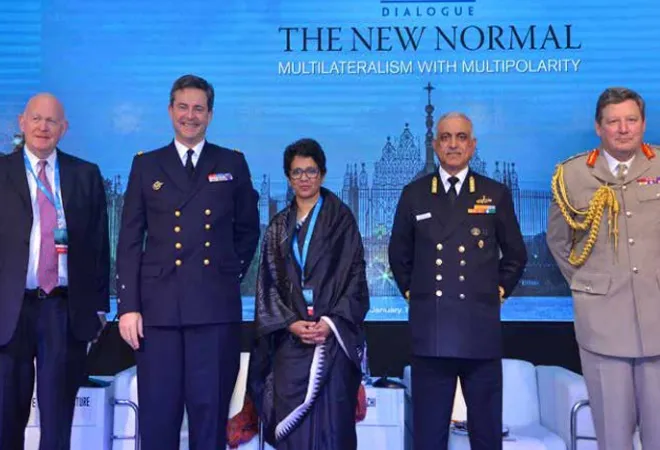
At the Raisina Dialogue 2017, several key themes took centerstage during a discussion on the “Evolving Politics of the Asia-Pacific.” One of them was Freedom of Navigation (FON) in the region and the expanding role of navies in the increasingly contested waters of the Indian Ocean, the South and Western Pacific Oceans.
FON operations assume particular salience, not only because of the volume of commercial activity carried out in the Indo-Pacific but also due to military competitions in the maritime domain. It is because of this economic interdependence and security competition that a complex interplay manifests in the region.
Expanding naval strength of specific countries and their competing maritime claims have caused a subversive effect on stability in Asia-Pacific. The legitimacy of undergirding maritime rights of states are under stress. Thus, by shifting the focus away from competition to cooperation, states in the Indo-Pacific region will have to accept or share common conception of the rules-based orders and norms underpinning FON in Asia-Pacific. Arbitrary maritime claims, which disregard international laws, will only open sluice gates for maritime territorial claims by various states.
The South China Sea is a case in point where Chinese maritime claims undermine Beijing’s self-declaration of rising peacefully. Expansion in Chinese naval power constrains FON operations in two ways: it allows China to press its latent maritime territorial claims, and it enables Beijing to control critical waterways and maritime territory through its Anti-Access/Area-Denial (A2/AD) strategy.
Today, navies across the region are gearing up to protect Sea Lines of Communication (SLOC) and secure—what they deem to be—their rightful economic and territorial rights. Given the high level of merchant traffic plying through the waters from the Western Pacific to the Indian Ocean and beyond, strategic Indo-Pacific waters are not only becoming increasingly congested but also a target for potential conflicts. Even navies from distant Europe have stakes in maritime stability in Asia-Pacific or Indo-Pacific. The UK has opened a base in Bahrain and holds military presence in Japan through its deployment of typhoon fighter squadron. France, too, is actively engaging in the region.
The US, however, is among the most consequential vectors of power in Asia-Pacific. The core role of the US in the last seven decades has been preservation of balance of power in Asia-Pacific. Possessing a potent navy with unlimited force projection capabilities, Washington has become vital to FON operations in Asia-Pacific. However, the rise of Chinese military strength leaves Washington with the unenviable and daunting task of balancing its significant economic ties with its allies in Asia-Pacific.
It is evident that trade will be a major source of contention between Beijing and Washington. A skewed trade imbalance favourable to China and its variable currency manipulation could trigger a trade war in due course. Beijing, for its part, sees its rise as bequeathing to it a natural and rightful place under the sun in Asia-Pacific, especially since Western and Japanese imperialism for the last 200 years have denied it the privilege it once enjoyed.
Meanwhile, Washington, particularly under the administration of US President Donald Trump, is likely to act unpredictably as long as China remains wedded to “Bùkě zhuǎnràng” (which translates in English to non-negotiable) and “Héxīn lìyì” (which translates to “core interest”). It is understood that when the two are paired, they are likely to become a recipe for confrontation. Unless well calibrated, the Trump administration’s converse policy of acting unpredictably could lead to the sowing of seeds of miscalculation.
The Chinese will hope that the United States would suspend freedom of navigation operations or at least not do them with two carriers at once or seeming to challenge Chinese waters. — Michael Pillsbury, Consultant, Department of Defense, USA
It therefore cannot be denied that some key areas will remain contentious between China and the US, such as the One China Policy. The US has supported the One China Policy for decades now, but the US military sales to Taiwan is a contentious area. It tugs at the gut of Chinese sovereignty because it is viewed in Beijing as Washington’s attempt to undermine Chinese claims over Taiwan, even if Washington expressed intent to support Taiwan’s peaceful reunification with the mainland. Beijing, on the other hand, views the reunification of Taiwan as the unfinished business of the Chinese civil war.
Nevertheless, political trajectory and evolution of Taiwan as a democratic entity places steep pressures on Washington to come to Taipei’s aid in the event of a Sino-Taiwanese war. Washington, for its part, has practised dual deterrence between the mainland and Taiwan. Washington’s dual deterrence posture has, for now, fostered caution and restraint in both Beijing and Taipei, but dual deterrence could become unsustainable for Washington since Chinese military power has grown exponentially over the last two decades. In this regard, the A2/AD strategy has been specifically developed towards negating any third-party intervention on behalf of Taiwan, thereby doubling or even tripling the costs and risks for Washington today than what they were two decades ago.
Further, there is the vexed issue of Tibet where the US sees a pressure point against China. Giving the Dalai Lama visitation rights and an opportunity to meet the president will strike a raw nerve in Beijing. Having said that, Tibet assumes particular salience for New Delhi because competition between China and Washington could become an invitation for military confrontation between India and China.
The views expressed above belong to the author(s). ORF research and analyses now available on Telegram! Click here to access our curated content — blogs, longforms and interviews.




 PREV
PREV


